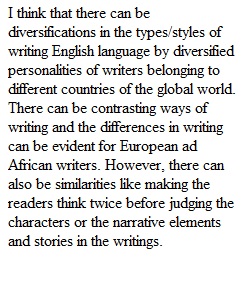


Q Achebe's discourse on globalization can be described as an address from the margin to the center (about how Africa's precolonial civilizations were rescripted or decimated by colonialism). But it is also a discourse that signifies the interconnected nature of globalization and the sometimes unscripted consequences or interpretations that this can lead to (in part because of our common humanity). Here's a short excerpt from a long interview with Achebe published in The Paris Review: ?? INTERVIEWER ?When you write, what audience do you have in mind? Is it ?Nigerian? Is it Igbo? Is it America? ??ACHEBE ?All of those. I have tried to describe my position in terms of ?circles, standing there in the middle. These circles contain the audiences ?that get to hear my story. The closest circle is the one closest ?to my home in Igboland, because the material I am using is their ?material. But unless I'm writing in the Igbo language, I use a language ?developed elsewhere, which is English. That affects the way ?I write. It even affects to some extent the stories I write. So there ?is, if you like, a kind of paradox there already. But then, if you can, ?visualize a large number of ever-widening circles, including all, like ?Yeats's widening gyre. As more and more people are incorporated ?in this network, they will get different levels of meaning out of the ?story, depending on what they already know, or what they suspect. ?These circles go on indefinitely to include, ultimately, the whole ?world. I have become more aware of this as my books become ?more widely known. At this particular time, mostly the news I hear ?is of translations of my books, especially Things Fall Apart . . . in ?Indonesia, in Thailand, Korea, Japan, China, and so on. ?Fortunately you don't think of all those people when you are writing. ?At least, I don't. When I'm writing, I really want to satisfy ?myself. I've got a story that I am working on and struggling with, ?and I want to tell it the most effective way I can. That's really what ?I struggle with. And the thought of who may be reading it may be ?there somewhere in the back of my mind-I'll never say it's not ?there because I don't know-but it's not really what I'm thinking ?about. After all, some people will say, Why does he put in all these ?Nigerian-English words? Some critics say that in frustration. And ?I feel like saying to them, "Go to hell! That's the way the story was ?given to me. And if you don't want to make this amount of effort, ?the kind of effort that my people have always made to understand ?Europe and the rest of the world, if you won't make this little leap, ?then leave it alone!" ??INTERVIEWER ?Are you ever surprised, when you travel around the world, by ?what readers make of your writings, or how they bond to them? ??ACHEBE ?Yes. Yes, yes, yes. I am. People make surprising comments to me. ?I think particularly of a shy-looking, white American boy who came ?into my office once-in the seventies, I think-at the University of ?Massachusetts and said to me, That man, Okonkwo, is my father! ? ?INTERVIEWER ?You were surprised! ??ACHEBE ?Yes! I was surprised. I looked at him and I said, All right! As ?I've said elsewhere, another person said the same thing: in a public ?discussion-a debate the two of us had in Florida-James Baldwin ?said, That man is my father. ?? INTERVIEWER ?Okonkwo? ?? ACHEBE ?Okonkwo.
View Related Questions